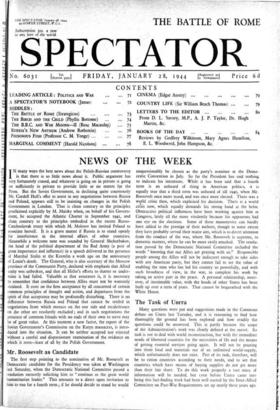NEWS OF THE WEEK
N many ways the best news about the Polish-Russian controversy I is that there is so little news about it. Public argument has very fortunately ceased, and whatever is going on in private is going on sufficiently in private to provide little or no matter for the Press. But the Soviet Government, in declining quite courteously Mr. Cordell Hull's offer to assist in any negotiations between Russia and Poland, appears still to be insisting on changes in the Polish Government in London. That is clean contrary to the principles proclaimed explicitly by M. Maisky when, on behalf of his Govern- ment, he accepted the Atlantic Charter in September 1941, and clean contrary to the principles embodied in the recent Russo- Czechoslovak treaty with which M. Molotov has invited Poland to associate herself. It is a grave matter if Russia is to stand openly for interference in the internal affairs of other countries. Meanwhile a welcome note was sounded by General Shcherbakov, the head of the political department of the Red Army (a post of great importance and influence) in a speech delivered in the presence of Marshal Stalin at the Kremlin a week ago on the anniversary of Lenin's death. The General, who is also secretary of the Moscow province of the Communist Party, declared with emphasis that Allied unity was unbroken, and that all Hitler's efforts to shatter or under- mine it had failed. Valuable as that assurance is, it is necessary to remember that confidence between Allies must not be wantonly strained. It rests on the firm acceptance by all concerned of certain common principles of thought and action, and departures from the spirit of that acceptance may be profoundly disturbing. There is no difference between Russia and Poland that cannot be settled in negotiations from which menace on the one side and recalcitrance on the other are resolutely excluded ; and in such negotiations the presence of common friends with no ends of their own to serve may be of great value. At this moment a new factor, the report of the Soviet Government's Commission on the Katyn massacres, is intro- duced into the situation. It can be neither accepted nor rejected 'without a careful and dispassionate examination of the evidence on which it rests—least of all by the Polish Government.


























